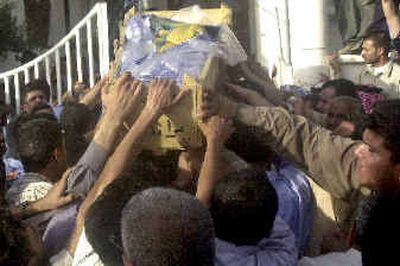Iraqis seek more control

BAGHDAD, Iraq — Members of the Iraqi Governing Council said Tuesday that the council chief killed the day before in a car bombing may have been delayed at a checkpoint in the minutes before the blast by American soldiers who didn’t recognize him.
The Governing Council members, speaking after a memorial service for Izzadine Saleem, said confusion at checkpoints endangers their lives and underscores the need for Iraqi security services to take control once the U.S.-led coalition returns limited autonomy to Iraqis by June 30.
Security was tightened around the Baghdad Convention Center in preparation for the first trial of a U.S. military policeman in the prisoner abuse scandal. Spc. Jeremy C. Sivits, 24, of Hyndman, Pa., will face a court-martial today on charges related to the sexual humiliation and abuse of Iraqis held at Abu Ghraib prison, west of Baghdad. If convicted, he faces up to a year in confinement, a bad conduct discharge and other penalties.
Three other accused servicemen will appear for arraignments. So far, seven soldiers, none of them an officer, have been charged since graphic photos of the apparent abuse were made public last month.
Saleem’s assassination, coupled with outrage over the prison abuses, uncertainty about the shape of a new Iraqi government and an insurgency that shows no sign of abating, are increasing pressure on the Bush administration to change course in Iraq.
In a rare statement issued in his name, Iraq’s most influential Shiite Muslim cleric, Grand Ayatollah Ali al Husseini al Sistani, on Tuesday asked American troops and radical Shiite militiamen to withdraw from two holy Shiite cities where U.S. forces have been trying to oust the Mahdi Army of junior cleric Muqtada al Sadr.
On Capitol Hill Tuesday, Deputy Defense Secretary Paul Wolfowitz, one of the chief architects of the Iraq war, conceded that the Pentagon underestimated Iraqi resistance to the U.S.-led invasion and said the administration moved too quickly to purge members of Saddam Hussein’s Baath Party from the Iraqi military and the government.
Iraqi Interior Minister Samir Shaker Mahmoud al Sumeidi said Tuesday that an Iraqi security force modeled after the U.S. Secret Service is being assembled to protect government officials. However, he said, the process has been slowed by problems vetting candidates for ties to Saddam’s regime.
For now, council members rely mainly on relatives who act as bodyguards. Some have begun using body doubles and decoy cars to foil assassination attempts.
The coalition provides flak vests, weapons, armored cars and training for security details, but council members stressed that vital decisions on personal protection should rest with Iraqis.
“The only solution is to recruit Iraqi police and security personnel, but we haven’t been able to do that because of Americans’ insistence on keeping security in their own hands,” said Hamed al Kifaey, the top spokesman for the council.
“We understand how the soldiers at checkpoints feel, and we never wanted any American to die. But this is how they run security, and they’ve paid for it. And we’ve also paid for it several times over.”